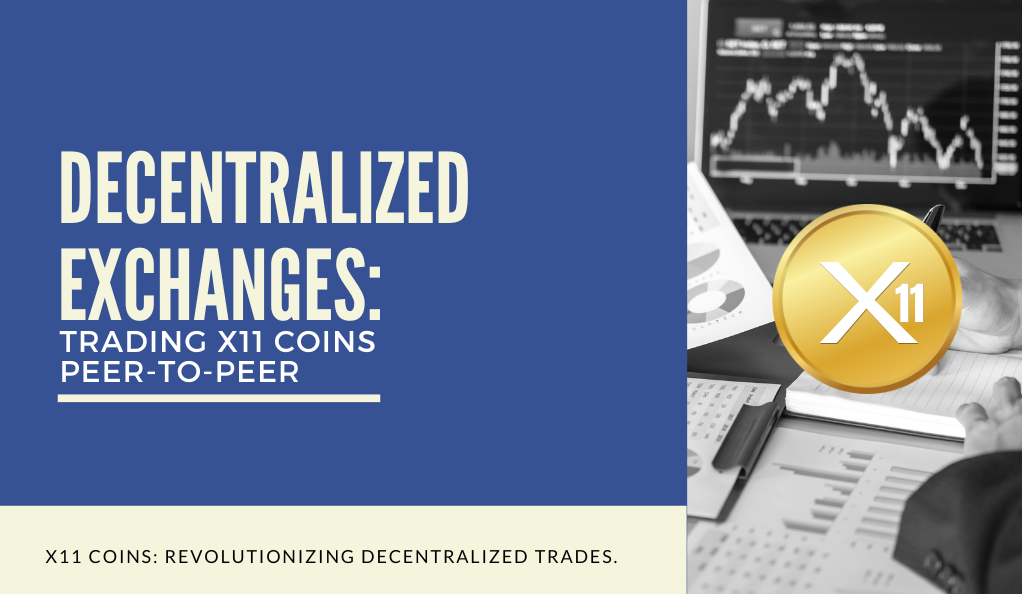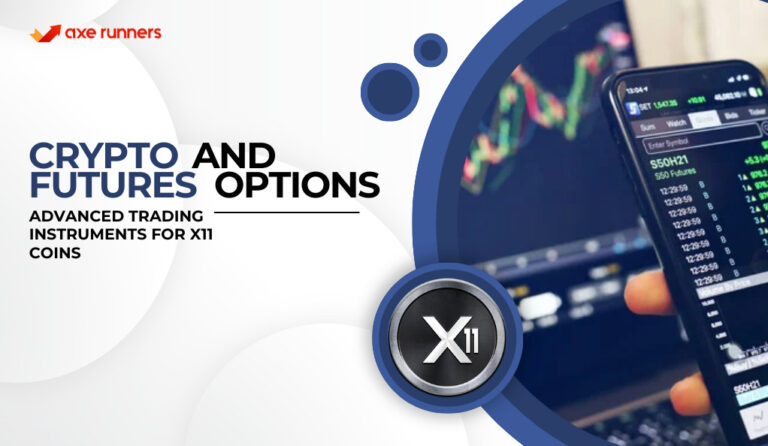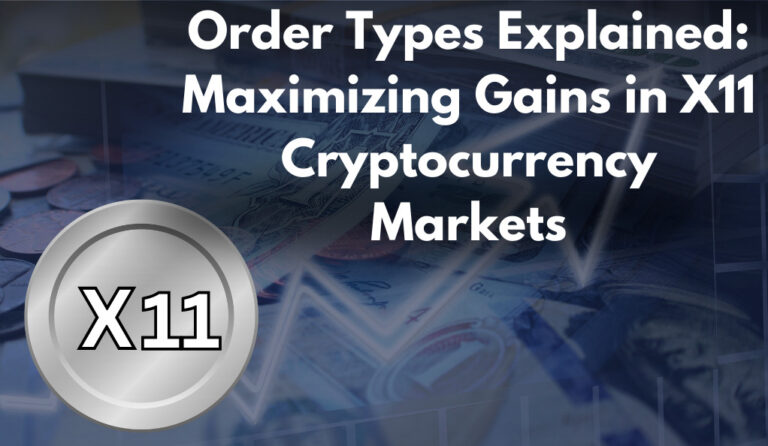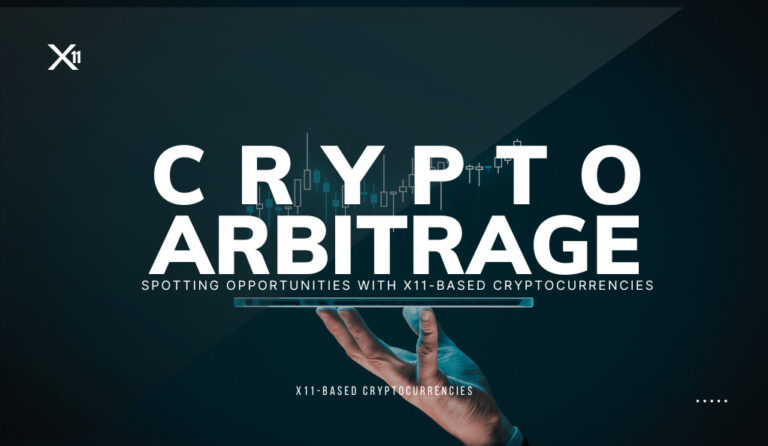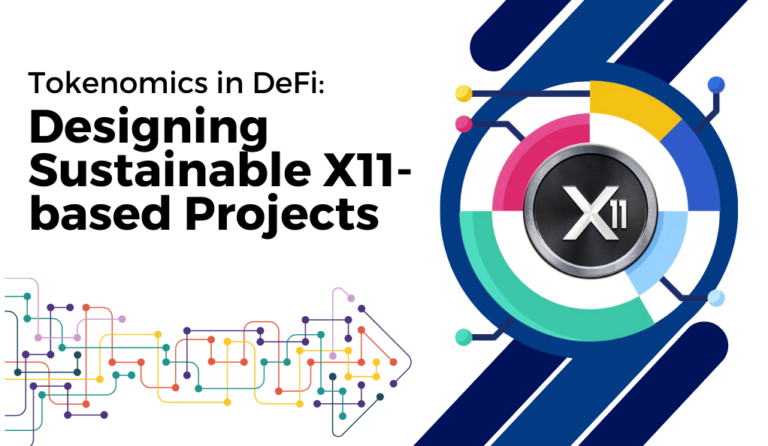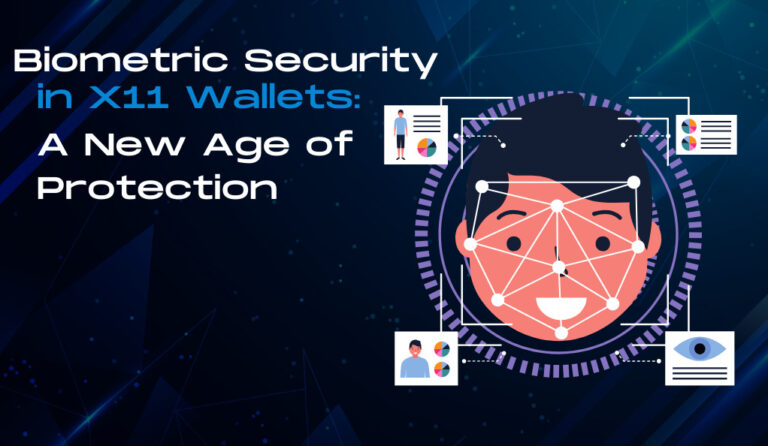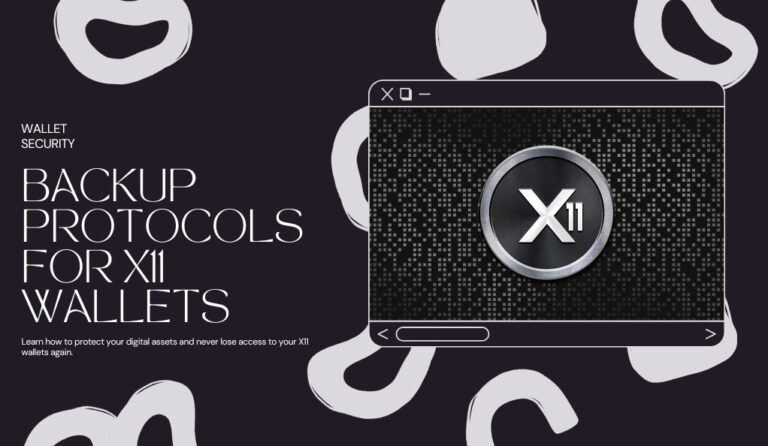In the vast and ever-evolving world of cryptocurrencies, X11 coins have emerged as a distinct category, capturing the attention of traders and enthusiasts alike. These coins, characterized by their unique algorithm, offer a blend of security and efficiency that few other cryptocurrencies can match. This algorithm, a combination of 11 different cryptographic functions, ensures robust protection against potential vulnerabilities, setting X11 coins apart in the crowded crypto space.
But the allure of X11 coins extends beyond just their technical prowess. In the decentralized trading landscape, they have become a focal point for several reasons. Their energy-efficient mining process appeals to environmentally conscious participants, while their adaptive mining capabilities ensure a fair and consistent experience for miners. Furthermore, as the crypto community becomes increasingly aware of potential threats from quantum computing, the multi-function nature of the X11 algorithm positions these coins as a future-proof option. In essence, X11 coins represent both the innovation and adaptability that the crypto world values so highly.
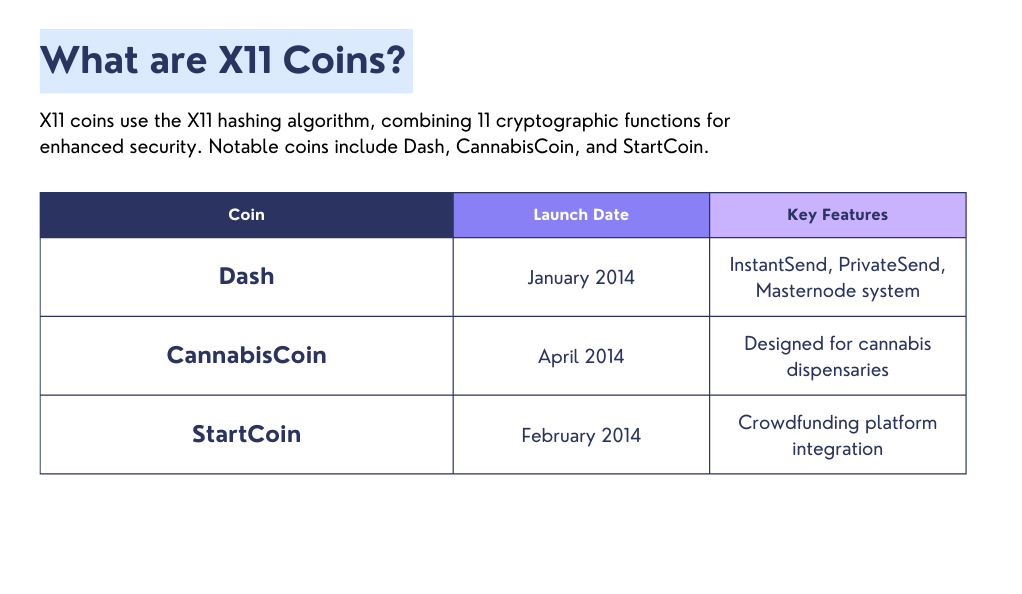
Why X11 Coins Matter in the Crypto Landscape
- Enhanced Security: The use of 11 different cryptographic functions ensures that X11 coins are resistant to potential vulnerabilities. Even if one or two of these functions were to be compromised, the remaining functions would keep the system secure.
- Energy Efficiency: X11 coins are known for their energy efficiency, especially when compared to coins that use other hashing algorithms. This makes mining these coins more environmentally friendly and cost-effective.
- Adaptive Mining: The X11 algorithm adjusts its difficulty level based on the total network rate. This ensures a more consistent and fair mining experience, preventing any single miner or pool from dominating the network.
- Future-Proofing: Given the rapid advancements in quantum computing, there’s a growing concern about the potential threats they pose to cryptographic systems. The multi-function nature of the X11 algorithm makes it more resistant to quantum attacks, ensuring the longevity and security of X11 coins.
X11 coins represent a significant and innovative segment of the cryptocurrency market. Their unique algorithm, combined with the benefits they offer, makes them a compelling choice for both traders and miners. As decentralized exchanges continue to rise in prominence, the role of X11 coins in peer-to-peer trading is set to become even more crucial.
Understanding Decentralized Exchanges (DEXs)
In the ever-evolving cryptocurrency landscape, a significant shift has occurred, moving away from traditional centralized exchanges to decentralized exchanges (DEXs). The key question is, what sets these two exchange types apart, and why are DEXs increasingly preferred for trading X11 coins?
Centralized exchanges (CEXs), similar to traditional banks, have been the go-to platforms for cryptocurrency trading. Users entrust these platforms with their assets, expecting secure transactions. However, CEXs have vulnerabilities, such as susceptibility to hacking and regulatory constraints.
DEXs operate without a central authority. They use blockchain technology and smart contracts to enable direct peer-to-peer trading. DEXs offer distinct advantages, including enhanced security through decentralization, user control over private keys, and permissionless, censorship-resistant trading. These attributes align perfectly with the security, privacy, and autonomy valued in X11 coin trading, making DEXs the preferred choice for many traders.
Centralized Exchanges (CEXs) vs. Decentralized Exchanges (DEXs)

At its core, a centralized exchange operates much like a traditional bank. Users deposit their funds into the exchange, and the exchange holds onto these funds, facilitating trades on behalf of the users. Some of the most popular centralized exchanges include Binance, Coinbase, and Kraken. While they offer a user-friendly interface and high liquidity, they come with their own set of challenges:
- Security Concerns: Centralized exchanges are prime targets for hackers. Over the years, several high-profile hacks have resulted in the loss of millions of dollars.
- Regulatory Issues: Being centralized entities, these exchanges are subject to regulations, which can sometimes limit the freedom of traders.
- Custody of Funds: Users don’t have direct control over their funds on CEXs. Instead, they rely on the exchange to manage and safeguard their assets.
On the other hand, decentralized exchanges operate without a central authority. They leverage blockchain technology to facilitate peer-to-peer trades directly between users. Here’s what sets DEXs apart:
- True Ownership: On a DEX, users retain control of their private keys and, by extension, their funds. This means they have true ownership of their assets.
- Enhanced Security: Without a central point of failure, DEXs are less susceptible to large-scale hacks. The decentralized nature distributes risk.
- Permissionless and Censorship-resistant: Anyone can access DEXs, trade on them, or even launch their own trading pairs. There’s no central authority to impose restrictions.
The Role of DEXs in Trading X11 Coins
With the unique features and benefits of X11 coins, DEXs provide the perfect platform for their trade. The security and efficiency of the X11 algorithm align well with the decentralized ethos of DEXs. Traders of X11 coins appreciate the autonomy, security, and privacy that DEXs offer, making them a natural choice for trading these coins.
In essence, as the crypto landscape evolves, the synergy between X11 coins and decentralized exchanges is becoming increasingly evident. This partnership promises to shape the future of cryptocurrency trading, offering traders more control, security, and flexibility.
Advantages of Trading X11 Coins on DEXs
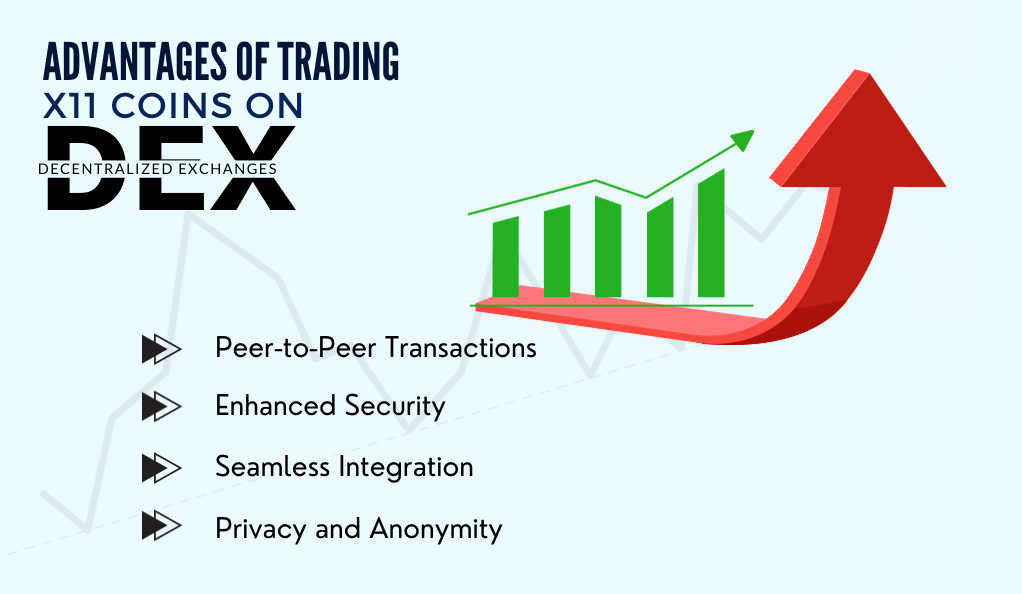
The rise of decentralized exchanges has brought forth a new era of trading, especially for unique cryptocurrencies like X11 coins. Let’s delve into the specific advantages of trading these coins on DEXs:
Peer-to-Peer Transactions Without Intermediaries
One of the most significant benefits of DEXs is the ability to conduct transactions directly between parties. When trading X11 coins on DEXs:
- Direct Control: Traders maintain direct control over their transactions, ensuring that trades are executed as intended without any third-party interference.
- Reduced Fees: Without intermediaries, the cost associated with trades often reduces, leading to more profitable transactions.
- Transparency: Every transaction on a DEX is recorded on the blockchain, ensuring complete transparency and traceability.
Enhanced Security and Reduced Risks of Hacks
The decentralized nature of DEXs offers a robust security framework, especially beneficial for X11 coins:
- No Central Point of Failure: DEXs distribute their operations across multiple nodes, making them less susceptible to targeted attacks.
- User Control: Since users retain control of their private keys, there’s a reduced risk of large-scale breaches that could compromise user funds.
- Trustless Environment: DEXs operate in a trustless environment where trades are executed based on smart contracts, eliminating the need for trust between trading parties.
Seamless Integration with Wallets and Platforms
Many DEXs offer seamless integration with various cryptocurrency wallets, especially those supporting X11 coins:
- Instant Access: Traders can directly access their funds and execute trades without transferring assets to an exchange wallet.
- Compatibility: Most DEXs are compatible with popular wallets, ensuring a smooth trading experience for X11 coin holders.
- Reduced Transaction Times: Direct wallet integrations often lead to faster transaction times, enhancing the overall trading experience.
Privacy and Anonymity
For many in the crypto community, privacy is paramount. Trading X11 coins on DEXs ensures:
- No Personal Data: Most DEXs don’t require personal information or KYC procedures, ensuring user anonymity.
- Private Transactions: The nature of X11 coins, combined with the privacy features of DEXs, allows for private and confidential transactions.
- Sovereignty Over Funds: Users have complete sovereignty over their funds, ensuring that their assets and transaction details remain private.
Trading X11 coins on decentralized exchanges not only aligns with the core principles of decentralization and autonomy but also offers tangible benefits that enhance the trading experience. As the crypto ecosystem continues to mature, the advantages of DEXs, especially for trading X11 coins, become increasingly evident.
Challenges in Trading X11 Coins on DEXs
While decentralized exchanges offer numerous advantages, especially for trading X11 coins, they are not without their challenges. Understanding these challenges is crucial for traders to make informed decisions.
Liquidity Concerns and Trading Volumes
One of the primary concerns with many DEXs is liquidity:
- Limited Liquidity: Some DEXs, especially newer or less popular ones, might not have the trading volume necessary to ensure smooth transactions for X11 coins. This can lead to price slippage or longer waiting times for trades to be executed.
- Fragmented Liquidity: Liquidity can be fragmented across various DEXs, meaning a trader might need to use multiple platforms to achieve the desired trading volume.
Potential Regulatory Hurdles and Compliance Issues
The decentralized nature of DEXs can sometimes clash with regulatory frameworks:
- Unclear Regulations: In many jurisdictions, the regulatory stance on DEXs remains unclear. This uncertainty can deter some traders from using DEXs for trading X11 coins.
- Compliance Concerns: Without a centralized entity overseeing operations, ensuring compliance with regional regulations can be challenging for DEXs.
User Experience and Learning Curve
For those new to the crypto space, DEXs can present a steeper learning curve:
- Complex Interfaces: Some DEXs might not be as user-friendly as their centralized counterparts, making it challenging for newcomers to navigate and execute trades.
- Responsibility: With great power comes great responsibility. Since users have full control over their funds, they also bear the responsibility for their security, including safeguarding their private keys.
Interoperability and Integration Issues
While many DEXs offer integrations with popular wallets, not all of them might support X11 coins:
- Limited Support: Some DEXs might not support all X11 coins, limiting trading options for users.
- Integration Challenges: Ensuring seamless integration between DEXs and various wallets or platforms can sometimes be technically challenging.
The Evolution of DEXs and Their Impact on X11 Coin Trading
The world of decentralized exchanges has seen rapid evolution, with each iteration aiming to address the challenges of its predecessors and enhance the trading experience. This evolution has had a profound impact on the trading of X11 coins.
Historical Milestones of DEXs
- Early Prototypes: The initial concepts of DEXs were rudimentary, focusing primarily on the decentralization aspect without much emphasis on user experience or functionality. These platforms laid the groundwork for what was to come.
- Integration of Smart Contracts: The introduction of smart contracts, especially on platforms like Ethereum, revolutionized DEXs. Automated and self-executing contracts allowed for trustless trades, paving the way for platforms like Uniswap and Sushiswap.
- Layer 2 Solutions and Scalability: As the crypto space grew, so did the demand for faster and more scalable solutions. Layer 2 solutions, such as the Lightning Network and Optimistic Rollups, were introduced to enhance transaction speeds and reduce costs.
- Cross-chain Interoperability: With the proliferation of various blockchains, the need for cross-chain trading became evident. DEXs began to integrate solutions to allow for seamless trading across different blockchains.
Influence on X11 Coin Adoption
The evolution of DEXs has played a pivotal role in the adoption and trading of X11 coins:
- Accessibility: Modern DEXs have made it easier for traders to access and trade X11 coins, even those that might not be listed on major centralized exchanges.
- Decentralized Finance (DeFi) Boom: The DeFi movement, which saw a significant surge in 2020 and beyond, brought with it a renewed interest in various cryptocurrencies, including X11 coins. DEXs, being at the forefront of DeFi, facilitated this interest.
- Community-driven Initiatives: Many DEXs are community-driven, leading to organic growth and genuine interest in the coins they support. This community backing has been beneficial for the adoption of X11 coins.
- Innovative Trading Mechanisms: DEXs have introduced innovative trading mechanisms, such as liquidity pools and automated market makers (AMMs), which have provided traders with more tools and options for trading X11 coins.
The continuous evolution of decentralized exchanges has not only addressed many of the challenges faced by traders but has also created a conducive environment for the growth and adoption of X11 coins. As DEXs continue to innovate and adapt, the future for X11 coin trading looks promising.
Future Prospects: X11 Coins on Decentralized Platforms
The crypto landscape is ever-evolving, and as we look ahead, the interplay between X11 coins and decentralized platforms promises exciting developments. Here’s a glimpse into what the future might hold:
Technological Advancements and Innovations
- Enhanced Scalability: As the demand for X11 coin trading grows, DEXs will likely integrate more advanced Layer 2 solutions and other scalability enhancements to accommodate higher transaction volumes.
- Improved User Experience: Recognizing the challenges some users face, DEXs are expected to focus on refining their user interfaces, making them more intuitive and user-friendly.
- Advanced Security Protocols: With the increasing sophistication of cyber threats, DEXs will likely incorporate more advanced security protocols, further safeguarding X11 coin transactions.
Expansion of DeFi and X11 Coin Integration
- DeFi Products: The DeFi sector will continue to expand, introducing new products and services. X11 coins, with their unique features, could play a pivotal role in some of these innovations.
- Staking and Yield Farming: As more platforms support X11 coins, opportunities for staking and yield farming with these coins might emerge, offering users additional avenues for earning.
Regulatory Clarity and Adoption
- Clearer Regulatory Frameworks: As governments and regulatory bodies become more familiar with DEXs and X11 coins, clearer regulatory frameworks are expected to emerge, providing traders with more certainty.
- Mainstream Adoption: With regulatory clarity and technological advancements, X11 coins could see more mainstream adoption, not just among crypto enthusiasts but also among traditional investors.
Cross-chain Solutions and Ecosystem Growth
- Seamless Interoperability: The future will likely see more DEXs offering seamless cross-chain trading solutions, allowing X11 coins to be traded across various blockchains effortlessly.
- Ecosystem Partnerships: Collaborations between X11 coin projects and other entities in the crypto space, such as wallet providers, other blockchain projects, and even traditional financial institutions, could drive further growth and adoption.
Conclusion
In the dynamic world of cryptocurrencies, the symbiotic relationship between X11 coins and decentralized exchanges (DEXs) stands as a testament to the power and potential of decentralization. The unique attributes of X11 coins, combined with the unparalleled security and autonomy offered by DEXs, have paved the way for a transformative trading experience. While challenges exist, the resilience and innovation of the crypto community consistently turn these hurdles into growth opportunities.
Looking ahead, the future for X11 coins on decentralized platforms shines brightly. As technology advances and the crypto ecosystem matures, X11 coins are poised for significant growth and broader adoption. Their integration into the expanding realm of Decentralized Finance (DeFi) and the promise of more user-centric trading platforms underscore the exciting possibilities that await in the decentralized financial landscape.
At axerunners.com, our goal is to furnish well-rounded and trustworthy information regarding cryptocurrency, finance, trading, and stocks. Nonetheless, we avoid providing financial advice and instead encourage users to conduct their own research and meticulous verification.
Read More
